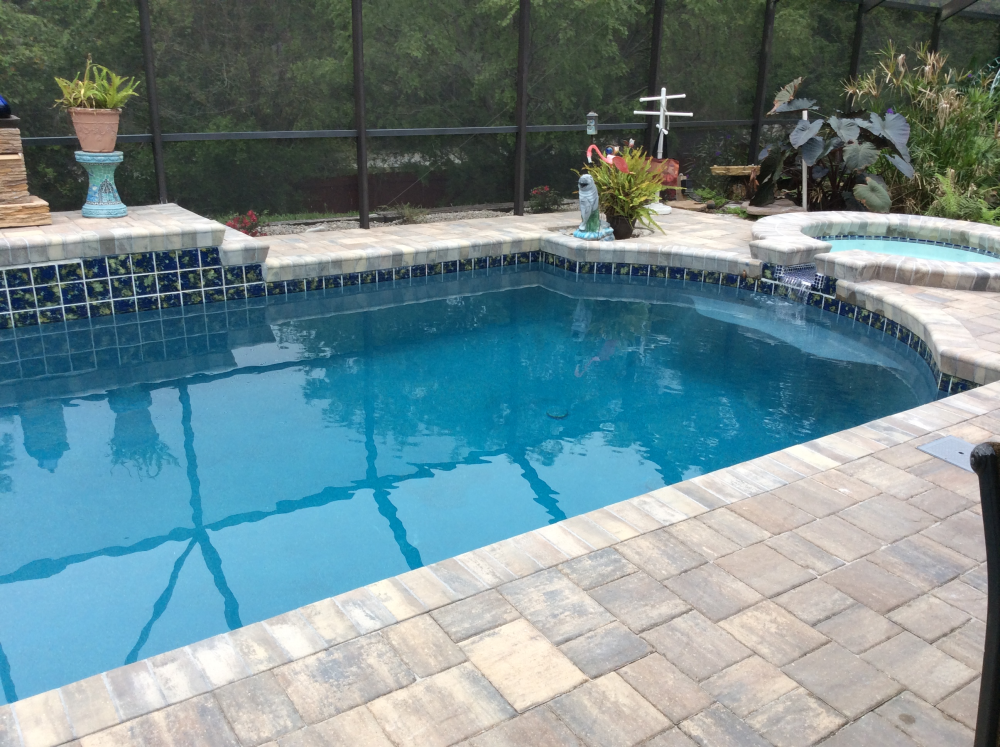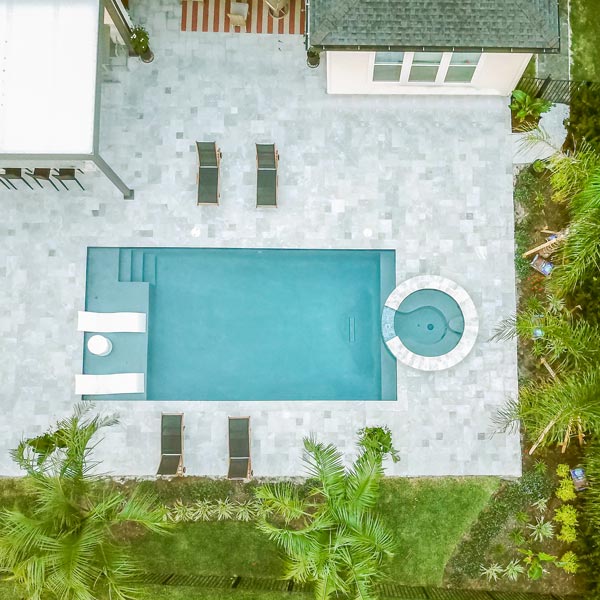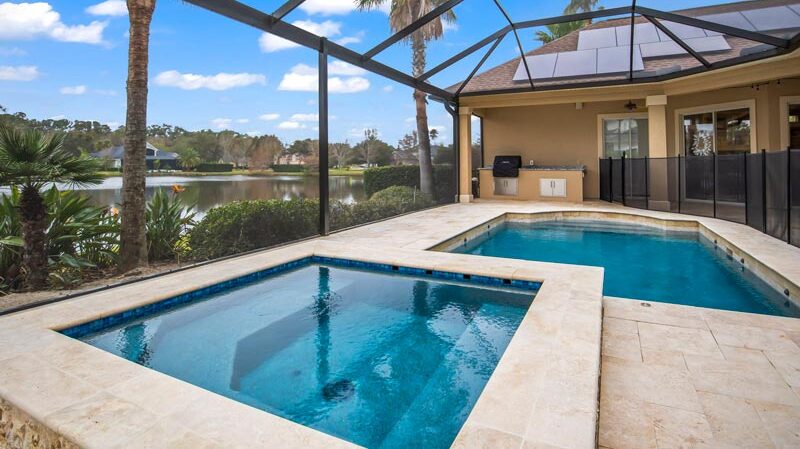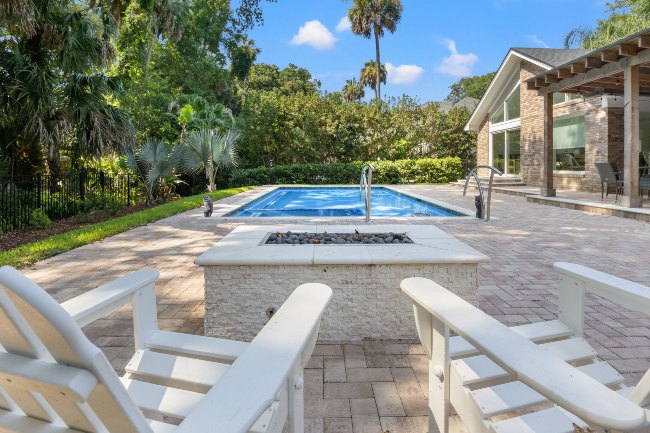Professional Pool Inspections in Jacksonville & St. Augustine, FL in Jacksonville & St. Augustine, FL

Restore and Purify Your Pool
For homebuyers in Jacksonville, FL, and neighboring areas, the presence of a pool can add an enticing element to a property. A pool can provide a private oasis for relaxation, a fun spot for exercise, and a unique space for entertaining guests.
A pool is a significant investment and like any other part of a home it requires regular maintenance and care. Overlooking the condition of a pool during the home buying process can lead to costly repairs and renovations down the line. A thorough pool inspection can be an indispensable part of the home purchasing journey.
We provide home buyers and sellers with comprehensive pool inspections in Jacksonville, FL and surrounding areas. We enable your family to swim freely within your pool peacefully and comfortably.
How Much Does a Pool Inspection Cost?
A pool inspection in Jacksonville, Florida, involves a thorough examination of the pool’s structure, equipment, and safety features. The cost can vary depending on the size and type of the pool, as well as the specific services provided by the inspection company. On average, the cost for a standard size residential pool is ranges from $500 to $1,500. It’s always a good idea to get a quote from your service provider for the most accurate pricing.
What is a Pool Inspection?
A pool inspection is a detailed assessment carried out by a professional inspector. The inspector evaluates the pool’s structure, equipment, safety features, and water quality. This process helps identify any existing issues or potential future problems that could impact the pool’s functionality or safety.
In this article we will delve into what this process entails, why it’s important, and how it can save you from unexpected costs and hassles in the future. Whether you’re a first-time homebuyer or a seasoned real estate investor, this guide will equip you with the knowledge you need to make informed decisions about your potential new home’s pool.
Understanding a Pool Inspection
A pool inspection is akin to a meticulous health check-up for your pool. It involves a comprehensive assessment of various aspects, ranging from the pool’s structural integrity to its operational components. The primary objective is to unearth existing issues and pinpoint potential future challenges.
Structural Integrity
The structural integrity of a pool is paramount to its longevity and safety. It’s the backbone of your pool, ensuring that it can withstand both the weight of the water it holds and the external pressures from the surrounding soil.
During an inspection, the pool’s structure is thoroughly examined. This includes:
Pool Shell or Liner
This is the interior of the pool where the water is held. Inspectors will check for any signs of damage such as cracks or leaks which could lead to water loss or further structural damage. They will also look for signs of settling or shifting in the pool shell, which could indicate issues with the soil or base material under the pool.Coping
Coping is the material around the edge of the pool. It serves both a functional and aesthetic purpose, protecting the pool structure and providing a safe, non-slip surface for swimmers to walk on. During an inspection, the coping will be checked for any signs of wear or damage, and to ensure it is securely attached to the pool structure.Surrounding Deck
The deck area around a pool not only adds to the aesthetic appeal of the pool but also provides a safe, comfortable area for swimmers to relax. Inspectors will check the deck for any signs of damage, such as cracking or lifting, which could present a tripping hazard. They will also ensure the deck has appropriate drainage to prevent water buildup which could lead to damage or safety issues.The structural integrity of a pool is a critical aspect of pool safety and longevity. A thorough inspection will identify any potential issues, allowing them to be addressed before they become major problems. This gives you peace of mind knowing that your pool is safe and ready for enjoyment.

Operational Components and Equipment Check
The operational components of a pool are the heart of its functionality and enjoyment. They ensure that the water is clean, safe, and at the right temperature. During an inspection, these components are thoroughly checked for proper operation and any signs of malfunction or impending failure.
1. Pump: The pump is the heart of your pool’s circulation system. It moves water from the pool to the filter, heater, and chlorinator, and then back to the pool. During an inspection, the pump is checked for efficient operation. This includes checking for any unusual noises, leaks, or signs of wear that could indicate a problem. The inspector will also ensure that the pump is properly sized for your pool and that it is achieving the correct flow rate.
2. Filter: The filter is responsible for removing debris from the pool water. There are three main types of pool filters: sand, cartridge, and diatomaceous earth (DE). Regardless of the type, the filter should be effectively removing debris from the water. During an inspection, the filter is checked for any signs of damage or wear, and the inspector will ensure that it is properly sized for your pool.
3. Heater: The heater controls the temperature of your pool, making it comfortable for swimming. During an inspection, the heater is checked for proper operation. This includes ensuring that it is maintaining the desired temperature and that there are no signs of malfunction, such as unusual noises or error codes. The inspector will also check the heater’s efficiency and ensure that it is properly sized for your pool.
4. Other Equipment: Depending on your pool, there may be other equipment that is also checked during an inspection. This could include items like a chlorinator, pool cleaner, lights, or automation system. Each of these items is checked for proper operation and any signs of malfunction.
The operational components of a pool are vital to its function and enjoyment. A thorough inspection ensures that these components are working properly and efficiently, providing you with a clean, safe, and enjoyable swimming experience.
Safety Features
Safety is a critical aspect of any pool, and an inspection includes a thorough review of the pool’s safety features. These features are designed to prevent accidents and ensure a safe environment for all pool users. Here’s what the inspection covers:
Gates and Fences:
Gates and fences are the first line of defense in preventing unsupervised access to the pool, especially for children and pets. During an inspection, the condition and operation of gates and fences are checked. This includes ensuring that gates are self-closing and self-latching, fences are at least 4 feet high, and there are no gaps or openings that could allow a child to squeeze through.Alarms:
Pool alarms can alert homeowners to unexpected entry into the pool area. This includes door alarms for any house doors leading to the pool area, gate alarms for the pool fence, and in-pool alarms that detect water movement. The inspector will ensure these alarms are functional and properly installed.Pool Covers:
A safety cover is a strong, tight-fitting barrier that can prevent access to the water when the pool is not in use. The inspector will check the condition of the cover and ensure it fits securely over the pool.Slip-Resistant Surfaces:
Slip-resistant surfaces around the pool area can help prevent falls and injuries. The inspector will check that these surfaces are in place and effective.Depth Markers and Safety Signs:
Clear, visible depth markers and safety signs can help prevent accidents by informing swimmers of pool rules and water depth. The inspector will check that these are present and clearly visible.Rescue Equipment:
Items such as life rings, reaching poles, and first aid kits can be crucial in the event of an emergency. The inspector will check that these items are present and easily accessible.A pool inspection includes a comprehensive review of all safety features. This ensures that your pool adheres to safety standards and provides a safe environment for all its users.
Water Quality
Water quality is essential for the health and enjoyment of those using the pool. It’s what makes the difference between a sparkling, inviting pool and one that is murky or unpleasant. During an inspection, the pool’s water is tested for proper chemical balance, clarity, and cleanliness. Here’s what that involves:
1. Chemical Balance: The chemical balance of pool water is crucial for preventing the growth of bacteria and algae, and for ensuring the water is comfortable for swimmers. This includes checking levels of chlorine, which disinfects the water; pH, which measures how acidic or basic the water is; and alkalinity, which helps stabilize the pH. The inspector will also check the level of cyanuric acid, which protects chlorine from sunlight; and the hardness of the water, which can affect the pool’s surfaces and equipment.
2. Clarity: Clear water is a sign of a healthy, well-maintained pool. The inspector will check the water’s clarity, looking for any cloudiness, discoloration, or visible debris. Issues with water clarity can indicate problems with the pool’s filtration system or chemical balance.
3. Cleanliness: A clean pool is a healthy pool. The inspector will check for signs of dirt, leaves, and other debris in the pool. They will also look for any signs of algae growth, which can make the pool slippery and unsafe, and can also clog the filter.
4. Other Parameters: Depending on the type of pool and the local climate, the inspector may also check other parameters. For example, they may test the water for total dissolved solids (TDS), which can affect water balance and clarity; or for salt levels, if it’s a saltwater pool.
Maintaining good water quality is crucial for the health and enjoyment of your pool. A pool inspection includes a thorough testing of the pool’s water to ensure it is clean, clear, and properly balanced. This not only ensures a safe and enjoyable swimming experience, but also helps protect the longevity of your pool’s surfaces and equipment.

Significance of a Pool Inspection
Purchasing a home with a pool represents a significant investment. It’s not just the cost of the property itself, but also the ongoing maintenance and potential repair costs associated with the pool. Consequently, a pool inspection serves as a safeguard for this investment by verifying the pool’s condition before finalizing the purchase.
A pool inspection provides a detailed overview of the current state of the pool. It identifies any existing issues, from minor cosmetic flaws to major structural problems, that could impact the value of the property or lead to significant repair costs down the line. By identifying these issues upfront, you can negotiate for repairs or a lower price before purchasing the property.
Moreover, a pool inspection acts as a preventative measure against unforeseen repair expenses that may crop up later on. It can identify potential future problems, such as aging equipment or structural issues, that might not be immediately apparent. By addressing these issues early, you can potentially save a significant amount of money in future repair costs.
In addition, a pool inspection can also provide peace of mind. Knowing that your pool is in good condition and that there are no hidden issues to worry about can make the home buying process much less stressful. It also allows you to fully enjoy your new pool from day one, without worrying about potential problems or safety issues.
In conclusion, a pool inspection is a crucial step when buying a home with a pool. It protects your investment, saves you money, and provides peace of mind. So whether you’re a first-time homebuyer or an experienced real estate investor, don’t skip the pool inspection!

Beyond Pool Inspections
At Coastal Luxury Outdoors, we understand that a pool is more than just a body of water - it’s an integral part of your home and lifestyle. That’s why, beyond pool inspections, we offer a wide range of services to enhance and maintain your outdoor oasis.
1. Routine Pool Maintenance: Keeping your pool pristine and operational requires regular maintenance. Our team of experts can handle everything from routine cleaning and chemical balancing to equipment checks and minor repairs. This ensures your pool remains in top condition year-round, ready for you to enjoy at a moment’s notice.
2. Pool Renovations: Over time, your pool may require updates or enhancements to keep it looking and functioning its best. Whether you’re looking to resurface your pool, upgrade your equipment, or even redesign the entire layout, our team can transform your pool into a modern, efficient, and aesthetically pleasing space.
3. Other Services: In addition to the above, we also offer a variety of other services to enhance your pool and outdoor living area. This includes landscaping, lighting, the installation of features like waterfalls or hot tubs, and much more.
A pool inspection is a crucial part of the home buying process when the property includes a pool. It provides a detailed assessment of the pool’s current condition, covering structural integrity, operational components, safety features, and water quality. This thorough check-up identifies any existing or potential future issues, protecting your investment and saving you from unexpected repair costs. It also ensures that the pool is safe, functional, and ready for enjoyment.
Coastal Luxury Outdoors offers professional pool inspections within a 50-mile radius of Jacksonville and St. Augustine, FL. We also service the St. Mary’s market in Georgia. Our services extend beyond inspections. We offer a comprehensive suite of services, including routine pool maintenance, pool renovations, and installation of outdoor kitchens, designed to enhance your outdoor living experience. Contact us today to schedule your pool inspection or to learn more about our services.

